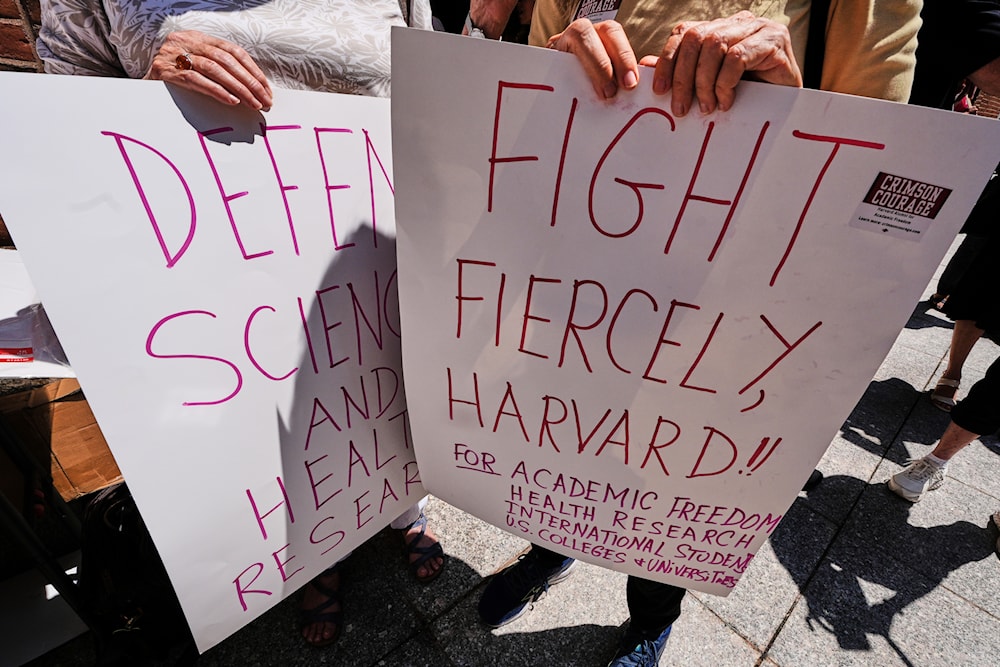Trump admin. puts Harvard under cash watch amid escalating feud
Harvard faces new federal scrutiny over finances and civil rights as it defends its stability and academic independence against the Trump administration's oversight.
-

Protesters gather outside the Moakley Federal Courthouse, where Harvard University appeared to challenge $2.6 billion in funding cuts by the Trump administration, Monday, July 21, 2025, in Boston (AP)
The US Department of Education announced Friday that Harvard University has been placed on heightened cash monitoring due to “growing concerns” over its “financial position", marking the latest measure by the Trump administration targeting the school.
Under the new oversight, the department’s Office of Federal Student Aid (FSA) will closely monitor Harvard’s spending and require the university to use its own funds to disburse federal student aid before drawing on federal money. According to the department, the change aims to “ensure Harvard is spending taxpayer funds responsibly.”
“Students will continue to have access to federal funding, but Harvard will be required to cover the initial disbursements as a guardrail to ensure Harvard is spending taxpayer funds responsibly,” the Department of Education said.
The FSA will also require Harvard to post “an irrevocable letter of credit for $36 million or provide other financial protection that is acceptable” to guarantee the university meets its obligations.
Wider context
The department cited “three triggering events” that led to the oversight: a finding that Harvard violated Title VI of the Civil Rights Act, its failure to comply with requests from the Office for Civil Rights (OCR), and concerns over the university’s plan to issue more than $1 billion in bonds to fund operations.
“Today’s actions follow Harvard’s own admission that there are material concerns about its financial health,” said US Secretary of Education Linda McMahon. “As a result, Harvard must now seek reimbursement after distributing federal student aid and post financial protection so that the Department can ensure taxpayer funds are not at risk. While Harvard remains eligible to participate in the federal student aid program for now, these actions are necessary to protect taxpayers.”
Separately, the OCR issued a “denial of access letter” to Harvard, citing the university’s “continued refusal to provide documents and information” for an ongoing compliance review into whether it illegally considered race in undergraduate admissions.
“The highest court in our nation ruled conclusively that Harvard was illegally using extreme racial preferencing in their admissions processes,” McMahon said. “The Department has both the right and responsibility to verify Harvard’s compliance with federal civil rights laws. For all their claims, they refuse to provide evidence necessary for the Department to make that determination. What are they hiding?”
Earlier this month, Harvard University secured a legal victory against the Trump administration after a federal judge ruled that the government illegally froze more than $2 billion in research funding. The decision marks a turning point in the broader conflict between the administration and leading academic institutions over issues of free speech, diversity, and alleged antisemitism on campus.
Wider clash over higher education
The funding dispute is only one aspect of the Trump administration’s ongoing campaign against elite universities. Beyond research grants, officials have threatened to challenge Harvard’s tax-exempt status and introduced measures that could cost the school nearly $1 billion annually, including new taxes on endowments.
Trump has also demanded hefty financial settlements, reportedly seeking at least $500 million from Harvard. By contrast, other universities, such as Columbia, have chosen to settle, with Columbia paying $221 million. Harvard, however, has opted to fight the government’s actions in court.
Although Harvard has secured a key legal victory, the conflict with the Trump administration is far from over. The government has already filed appeals and continues to argue that civil rights enforcement justifies its actions.

 4 Min Read
4 Min Read










